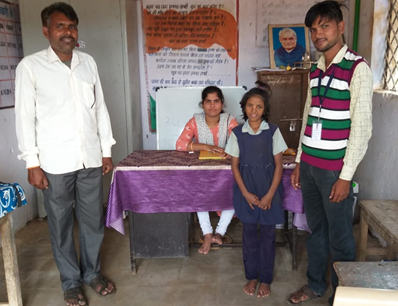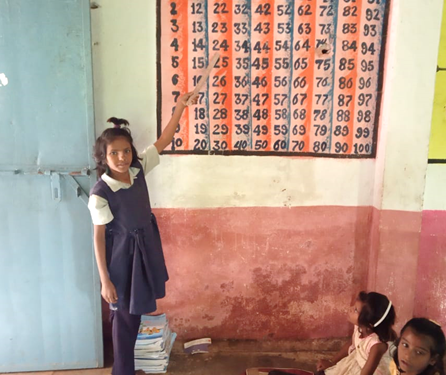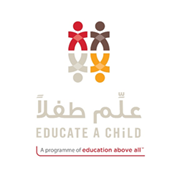Educating The Most Marginalised Girls In India: It Takes A Community


This story depicts the hardships that Educate Girls’ frontline workers endure to ensure that no girl in their village is left behind.
Satish Yadav (23) who works with Educate Girls as a Field Coordinator looks after the implementation of the core programme in eight villages of Khandwa district (in Madhya Pradesh), instructing village-based volunteers there. With a Master’s degree in Economics and work experience as a teacher, he is passionate about education for all and this is what led him to join Educate Girls in 2018.
One winter morning when Satish was on his way to visit one of the villages, he spotted a frail-looking girl sitting near a temple, her hands outstretched for alms. Her mother begged at another spot farther away. “I was covered in three layers of clothing, but the girl sat there without any warm clothes on, not even a chappal (footwear) to cover her feet,” recalls Satish. As he entered the village and met with Manga Ram (45), the local volunteer there, he was informed that the girl’s name was Mala*, that she was around 7-8 years old and had never been to school. Mala’s name was already featured on the target list of out of school girls, first drawn during a door-to-door survey. Manga Ram further informed that all efforts to enrol the girl had been unsuccessful.
Mala’s family lived below the poverty line. They had neither money, nor possessions. Her father, who worked as labourer in a nearby town, blew all his wages on night life. Her mother took to begging for survival. When she noticed that people felt more pity for a child, she got Mala to beg with her. Their village is so impoverished that families there could only offer them a place to sleep at night. Manga Ram tried several times to speak to the mother about Mala’s enrolment in school, but each time she flatly refused. “Four begging hands give more money than two begging hands,” she argued and would leave the village whenever she saw Manga Ram or any other Educate Girls’ representative.
Satish was adamant about bringing Mala to school, but he also knew he would need support from the entire community. He guided Manga Ram in developing a two-pronged strategy, consisting of community mobilisation and parental counselling. This way they first approached the most influential people in the village – the Sarpanch (head of village), the school teacher and an Anganwadi (rural child care centre) helper. They conducted neighbourhood meetings to talk about the benefits of educating girls where the Anganwadi helper ensured Mala’s mother was present. In effect, they addressed collective mind sets and garnered support for the cause. Ultimately, other families got involved and cajoled the mother to sit for one-on-one counselling with Satish and Manga Ram.
At the meeting, Mala’s mother was told of all the wonderful things that her daughter could achieve with education. Examples of female teachers, police officers, political leaders were cited. But, her mother wouldn’t relent. “We need to beg for our next meal. How is her education going to help?” she cried. “So you must send Mala to school at least for the mid-day meal,” said Satish and this was a moment of clarity! Food was the mother’s central concern. If school was a place where Mala could get a good meal, then why not?
However, the process to enrol Mala was no cake walk. Mala did not have any valid, government-issued ID, which is mandatory. Satish went out of his way, spoke to the government officials and ensured that her individual identity number (Aadhaar card) was issued in time. Mala has been enrolled in school since June 2019, at the start of the new academic year. At the moment, she is in a bridge course and taking extra classes to help her catch up to the level of her schoolmates.

We met Mala on the 100th day of her school journey and asked her how she feels. In a shy, but happy voice she said, “My school is so nice. I have good friends here and I play with them. I like my teachers and the food. When we would beg, I did not have a plate and a spoon. We used to keep the food on a big leaf. Eating with a spoon is different. My teachers also gave me new clothes (uniform) and soap to wash my body and hair. I feel clean. There is also a toilet here that I use.” When asked about what she likes the most in school, she was quick to reply – “writing on the blackboard!” Mala already dreams of becoming a teacher!

Mala’s mother is very proud of her decision, “Agreeing to send her to school is the best thing I have done in many years. Earlier when I watched Mala plead to people for alms, I would worry about her security. We are vulnerable women after all. But her school is a safe place. I am ashamed it took me so long to enroll her. I can see the happiness in her eyes. She brings her books to me and tells me everything that was taught to her. I can see that her future is not on the streets. 2019 could be the start of a better future for my daughter and me.”
With a large geography to manage, Satish’s job is a tough one. It’s tiring and can be overwhelming on some days. But according to him, his time at Educate Girls has impacted him deeply, “My elder sister was married off very young and much against her will. She wanted to study but couldn’t. I couldn’t do much for her then as I feared my father. Years later I can see how her inability to read and write has become such a limitation. She cannot read a simple document or sign her name or even make simple calculations. I was living with a huge guilt. So when I had the opportunity to join Educate Girls, I thought I could take a stand for other girls in my community. My personal experience pushes me to work with utmost dedication. When I see these girls, I see my own sister and I want to be able to change the story for them. I am proud to be an active part of an important transformation in their lives. 2019 has been a satisfying year as we have managed to enroll many girls like Mala living in the most marginalised communities who were harder-to-enrol cases.”
Educate A Child (EAC), a global programme of the Education Above All (EAA) Foundation, has partnered with Educate Girls to identify out of school children like Mala and make sure that they have access to quality primary education.
With the support of EAC, Educate Girls has been working in some of the most remote and marginalised communities of India, providing over 215,000 formerly out of school children (OOSC) an opportunity to learn, thereby contributing directly to the UN’s SDG 4 and indirectly impacting a number of other SDGs.

*name changed.
Educate Girls
Posted on November 13, 2019
Interested in contributing towards
educating girls?
Quick Links
Resources & More
Keep helping. Stay Updated.
Child Protection Policy | Privacy Policy | Terms of Use | Employee Login | IT Assets
Educate Girls is a project of Foundation To Educate Girls Globally (FEGG) | FEGG is registered in India under Section 8 of the Indian Companies Act, 2013.
© 2018 All rights reserved. Educate Girls.

